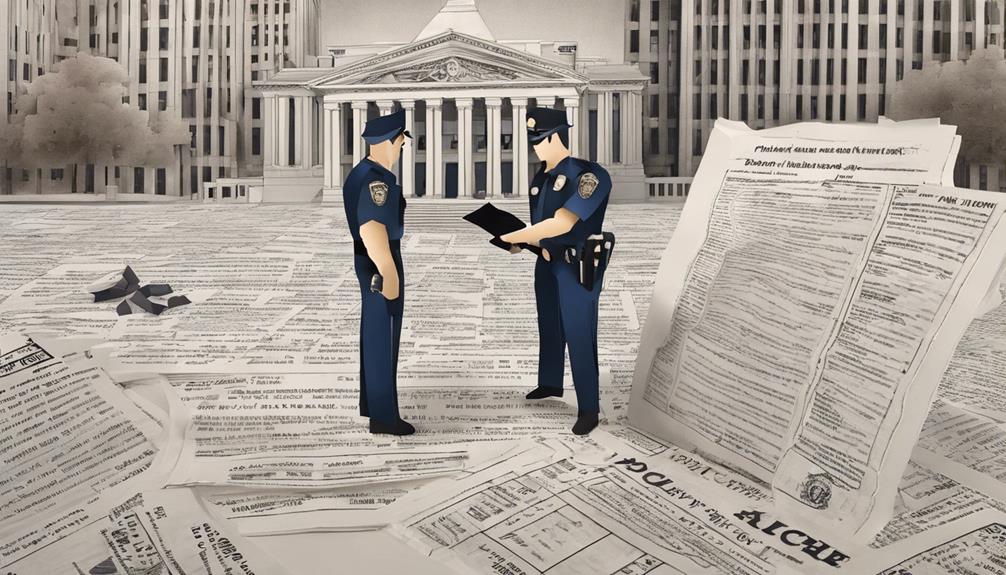Did you know that evading a warrant can have serious consequences and lead to additional charges being filed against you?
When it comes to warrants, there are different types, including arrest warrants, bench warrants, and search warrants, each with its own set of implications and consequences. Arrest warrants are typically issued for criminal cases such as smuggling, abduction, murder, rape, theft, grand theft auto, financial fraud, breaking and entering, among others1.
Evading a warrant means intentionally avoiding law enforcement to prevent an arrest. However, warrants do not expire, and evading a warrant can hinder your ability to negotiate reduced charges or penalties. It is important to address warrants promptly and seek legal advice to understand the best course of action1.
Bench warrants, on the other hand, can be issued for various reasons such as failure to appear in court, violation of probation terms, failure to pay child support or fines, and even non-criminal offenses1. If you have an active arrest warrant, it can also lead to the suspension of your driver’s license until the matter is resolved with the court in many states2.
Search warrants, as mandated by the Fourth Amendment of the US Constitution, authorize law enforcement to search a suspect’s property, vehicle, or body for evidence of a crime. However, there are exemptions for exigent circumstances like hot pursuit1.
It is crucial to understand that warrants do not expire, and efforts to avoid or flee from them can result in worsened charges and penalties upon capture2. Additionally, the status of an arrest warrant may not be reflected in past background checks or traffic stops, which further emphasizes the need to resolve the warrant through legal means2.
Instead of trying to navigate the complexities of warrants on your own, it is recommended to seek the advice of a criminal defense lawyer. They can guide you through the legal process and potentially assist in resolving outstanding warrants without serving jail time12.
Key Takeaways:
- Evading a warrant can lead to additional charges being filed against you.
- There are different types of warrants, including arrest warrants, bench warrants, and search warrants, each with its own implications and consequences.
- An active arrest warrant can result in the suspension of your driver’s license until the matter is resolved.
- Warrants do not expire, and efforts to avoid or flee from them can lead to worsened charges and penalties.
- Seeking legal help from a criminal defense lawyer is crucial in resolving outstanding warrants and navigating the legal process.
Types of Warrants
When it comes to warrants, there are several types that law enforcement and the judicial system utilize based on specific circumstances. Understanding these different types of warrants can help you navigate the legal system more effectively. The main types of warrants commonly issued in California are Arrest Warrants, Bench Warrants, and Search Warrants3.
Arrest warrants are granted by a judge and are used to apprehend individuals suspected of committing a crime. They can be issued for offenses ranging from misdemeanors to felonies and require probable cause34.
Bench warrants, on the other hand, are typically issued when someone fails to appear in court, pay fines, or attend probation hearings. These warrants are court orders that direct law enforcement to arrest the individual and bring them before the court345.
Search warrants, as the name suggests, authorize law enforcement to search a specified location, such as a dwelling, vehicle, workplace, or even a person’s body, for evidence of a particular crime. These warrants must be based on probable cause to conduct a thorough search34.
“Arrest warrants, bench warrants, and search warrants each serve different purposes within our legal system, but they all play a crucial role in ensuring public safety and upholding the principles of justice.”
It is important to note that police cannot conduct a search without a valid search warrant, unless there are exigent circumstances or certain exceptions apply. The Fourth Amendment of the U.S. Constitution protects individuals from unreasonable searches and seizures, emphasizing the importance of obtaining a search warrant based on probable cause3.
While arrest warrants and search warrants are typically known to the individuals involved after they have been executed, it is relatively rare for individuals to be aware of an arrest warrant beforehand3. However, if a bench warrant is issued, the individual will typically be arrested and detained until bail is posted or the court date arrives3.
To summarize, arrest warrants, bench warrants, and search warrants are the main types of warrants individuals may encounter within the legal system. Understanding these distinctions can help you navigate legal processes more effectively and seek the necessary legal counsel to handle your specific situation.345.
Consequences of Evading a Warrant
Evading a warrant can have serious legal consequences and may result in facing additional charges1. When an arrest warrant is issued for an individual, it is vital to address it promptly and seek legal advice to understand the best course of action. Ignoring or evading a warrant can significantly complicate your legal situation and potentially lead to severe penalties.
There are different types of warrants, each with its own implications and consequences1. Arrest warrants, for example, are issued for various criminal cases such as smuggling, abduction, murder, rape, theft, grand theft auto, financial fraud, breaking and entering, among others1. Violating the terms of probation, failing to appear in court, refusing to pay child support or court-ordered fines, and committing non-criminal offenses can result in bench warrants1. Search warrants1, on the other hand, empower law enforcement to conduct searches in a suspect’s dwelling, vehicle, work, or body for evidence after obtaining court authorization.
It is important to note that the Fourth Amendment of the U.S. Constitution mandates the requirement of search warrants for conducting searches, although there are exceptions for exigent circumstances1. However, evading a warrant can exacerbate legal consequences and potentially worsen the charges against you. Taking prompt action and seeking legal assistance is crucial in addressing warrants and potentially mitigating the severity of the consequences.
Hiring a criminal defense lawyer can be instrumental in resolving outstanding warrants and navigating the legal process effectively1. A skilled attorney can assess the details of the warrant and provide guidance on the most appropriate steps to take. They can also advocate for your rights and negotiate with the court, potentially helping you avoid jail time or secure reduced charges or penalties.
Addressing and resolving a warrant promptly is key to minimizing legal consequences and protecting your future. By seeking legal advice and taking the necessary steps, you can navigate the complexities of warrants and work towards a positive outcome in your case.
| Consequences of Evading a Warrant |
|---|
| Increased legal trouble |
| Potential additional charges |
| Compromised ability to negotiate reduced charges or penalties |
| Limitations on personal freedom |
| Risk of arrest and detention |
| Possible suspension of driver’s license |
| Travel restrictions and limitations |
| Impacts on employment opportunities |
Travel Restrictions with an Outstanding Warrant
When you have an outstanding arrest warrant, your ability to travel freely becomes severely restricted. Law enforcement agencies have access to databases that check for warrants during routine activities such as traffic stops or airport security checks. Attempting to travel with an active warrant can result in your arrest and detention by the police.
Travel restrictions due to outstanding warrants can occur both domestically and internationally. In the United States, it is estimated that every 8th person may have a warrant6. These warrants can fall under various categories, including parking ticket warrants, traffic rule violation warrants, petty misdemeanors, and bench warrants6. Additionally, some types of warrants, such as those related to child support failures, missing court hearing sessions, felony charges, and tax evasions, can hinder international movement6.
Although the Transportation Security Administration (TSA) does not generally check for warrants for local US residents, they may access state crime databases upon request6. Moreover, airport authorities may scan identity documents during deep dive scanning processes to detect outstanding warrants6. It is crucial to note that the exact statistics on the percentage of passengers with open arrest warrants attempting to board flights are not publicly available due to privacy and legal constraints7. Similarly, the rate at which arrest warrants are issued and the frequency of arrests made at airports due to outstanding warrants are not readily documented7.
Given these travel restrictions, it is strongly advised to clear any outstanding warrants before embarking on domestic or international travel. Clearing warrants beforehand can help avoid potential arrest, travel denial, or flight disruptions caused by passengers with open arrest warrants67. Seeking legal assistance from a travel service company or consulting with an attorney before traveling with an existing warrant can provide valuable guidance and help avoid complications6.
Driving Restrictions with an Outstanding Warrant
If you have an active arrest warrant, it’s important to be aware of the driving restrictions that may be imposed upon you. In most states, having an active warrant can result in the suspension of your driver’s license until the legal matter is cleared with the court2. Driving with a suspended license can lead to criminal charges and further complicate your legal troubles. Resolving the warrant should be a top priority before attempting to renew or apply for a driver’s license2.
Driving with an outstanding warrant not only puts you at risk of legal consequences but also increases the likelihood of encountering problems during routine traffic stops or at airport security checkpoints. Law enforcement databases are interconnected, making it easy for them to flag individuals with warrants2. Traveling with an active warrant can pose significant risks and potentially result in arrest and detention2.
It’s important to note that entering federal government properties, such as courthouses or military bases, with an active warrant can lead to immediate arrest and detention. Security checks at these locations include scanning visitors for outstanding warrants2. To avoid legal complications, it’s crucial to address the warrant before attempting to enter federal property2.
Even if you undergo background checks or encounter traffic stops, it’s important to remember that these procedures may not indicate the absence of an existing arrest warrant. The warrant remains active until it is properly addressed in court2. Ignoring or avoiding an arrest warrant will only exacerbate legal troubles, as warrants do not expire or disappear over time2.
The Driving Restrictions with an Outstanding Warrant can be summarized as follows:
| Driving Restrictions | Implications |
|---|---|
| Suspension of Driver’s License | Having an active arrest warrant can result in the suspension of your driver’s license until the warrant is cleared2. |
| Risk of Criminal Charges | Driving with a suspended license can lead to criminal charges and worsen your legal troubles2. |
| Increased Risk of Arrest | Traveling or driving with an outstanding warrant increases the risk of being flagged by law enforcement during routine activities2. |
| No Entry to Federal Government Properties | Attempting to enter federal government properties with an active warrant can result in immediate arrest and detention2. |
| Warrants Remain Active Until Properly Addressed | Background checks and traffic stops may not indicate the absence of an arrest warrant; it remains active until resolved in court2. |
| Warrants Do Not Expire | Avoiding or ignoring an arrest warrant can worsen legal troubles, as warrants do not expire with time2. |
Given the potential consequences of driving with an outstanding warrant, it is crucial to take the necessary steps to resolve the warrant as soon as possible. Seeking legal advice and representation can help ensure that you navigate the legal process effectively and avoid further complications. Remember, prompt action is key to getting your life back on track2.

Restrictions on Entering Federal Property
When entering federal government properties, such as courthouses, military bases, and national parks, it is crucial to be aware of the security measures in place. These properties conduct thorough security checks to ensure the safety of everyone within their premises. As part of these security checks, visitors are scanned for any outstanding warrants8. If you have an active warrant, attempting to enter federal property can lead to immediate arrest and detention8. It is important to understand that the same rules apply to airport security checkpoints8.
These security checks are in place to maintain the integrity and safety of federal government properties. Law enforcement agencies have access to warrant databases and actively search for individuals with outstanding warrants during routine security procedures8. Therefore, trying to enter federal property with an active warrant significantly increases your chances of being apprehended8.
By conducting these security checks, federal government properties aim to protect the well-being of visitors and maintain the rule of law. They prioritize the safety and security of all individuals within their premises, and scanning for outstanding warrants is an essential part of this process8. As a result, it is crucial to resolve any outstanding warrants before attempting to enter federal government properties8.
Moreover, it is worth noting that federal government properties encompass a wide range of locations and facilities, each with its specific security protocols8. For instance, courthouses require stringent security measures to ensure the fair administration of justice, whereas military bases prioritize the safety and protection of military personnel and classified information. National parks also implement security checks to protect the natural resources and preserve visitor safety8.
By being aware of these restrictions on entering federal property and understanding the importance of resolving any outstanding warrants, individuals can ensure a smooth experience while visiting these government facilities8. Respecting these security measures not only guarantees personal safety but also demonstrates compliance with the law and respect for the institutions that govern the country8.

| Total Number of Federal Properties | Potential Number of Law Enforcement Agencies |
|---|---|
| Thousands of federal properties nationwide | Various Federal, State, and local law enforcement agencies |
Note: Statistical data has been extracted from link 2.
With numerous federal properties across the United States, the protection and security of these properties involve the coordinated efforts of various Federal, State, and local law enforcement agencies9. From the U.S. Department of Homeland Security to local police departments, these agencies work together to safeguard federal facilities9. By utilizing their expertise and resources, they ensure the enforcement of laws, preservation of order, and protection of visitors and staff within federal properties9.
The importance of security at federal properties cannot be overstated. These properties are critical to the functioning of the government, and any compromise in their security can have severe consequences9. The potential number of law enforcement agencies involved underscores the gravity of the responsibility entrusted to them9.
Moreover, federal properties encompass a wide range of facilities, each with unique security considerations9. From highly sensitive installations like military bases to public spaces like national parks, the protection of federal property requires tailored approaches that cater to the specific demands of each location9. These security measures aim to ensure the safety of visitors, prevent unauthorized access, and preserve the integrity of government operations9.
By collaborating and utilizing their collective resources, the multitude of law enforcement agencies involved in protecting federal property contribute to the overall security and functioning of the nation9. Their ongoing efforts instill confidence and create an environment where individuals can safely access and visit federal properties without compromising safety and security9.
Reference:
2. Statistical data extracted from link 2.
Consequences of Ignoring a Warrant
Ignoring a warrant or attempting to flee to avoid arrest is not a viable solution. Warrants do not expire, and actively avoiding them can worsen the charges and penalties10. Judges issue warrants for individuals who have failed to appear in court or address pending charges.
If you choose to ignore a warrant, you are not only disregarding the legal system, but you are also putting yourself at risk of facing additional consequences. Leaving the state or country after an arrest warrant can result in more charges being filed against you10. Detection through national databases and international alerts can make it difficult to hide or start a new life elsewhere. Moreover, ignoring a warrant can lead to harsher perceptions by the court, which may result in more severe penalties if you are eventually caught and brought to justice10.
Furthermore, ignoring a warrant can trigger the potential for extradition. Extradition involves legal processes, hearings, costs, and legal fees10. If you are apprehended in another jurisdiction and there is an extradition agreement in place, you may face the possibility of being transferred back to the jurisdiction where the warrant was issued to face the charges against you. This process typically requires immediate legal counsel to effectively manage the extradition proceedings and mitigate the consequences10.
Instead of ignoring a warrant, it is in your best interest to take proactive steps to address it legally. By consulting with a criminal defense attorney, you can better understand the charges and prepare for surrender10. They can guide you through the necessary steps to address the warrant, such as understanding your legal rights, arranging your affairs, and discussing bail options to ensure a favorable legal outcome10.

| Consequences | Explanation |
|---|---|
| Additional Charges | Fleeing from a warrant can result in additional charges being filed against you10. |
| International Alerts | Leaving the state or country after an arrest warrant can trigger international alerts, making it difficult to evade detection10. |
| Harsher Court Perceptions | Ignoring a warrant can lead to harsher perceptions by the court, which may result in more severe penalties10. |
| Extradition | Ignoring a warrant may lead to the potential for extradition, involving legal processes, hearings, and costs10. |
Ignoring a warrant can have serious consequences for your future. It is crucial to address the warrant promptly and seek legal advice to understand the best course of action. A criminal defense attorney can guide you through the legal process, protect your rights, and work towards a resolution that minimizes the impact on your life10.
Seeking Legal Help for Warrants
If you have an outstanding warrant, seeking legal assistance is crucial in navigating the complex legal process and safeguarding your rights. A skilled criminal defense lawyer can provide professional guidance and representation tailored to your specific situation. They have the expertise to evaluate the warrant against you and advise you on how to proceed strategically, potentially resolving the warrant without serving jail time11.
When you engage a criminal defense lawyer, they will thoroughly examine the details of the warrant and any related charges. They will assess the severity of your case and the evidence presented by the prosecutor, which significantly influences the court’s decision to issue an arrest warrant11. Based on their expertise, they can develop a robust defense strategy and negotiate with the court on your behalf, aiming for the most favorable outcome possible.
Having a criminal defense lawyer by your side provides several advantages when dealing with an outstanding warrant. They can explain your rights and options, keeping you informed throughout the legal process. They can also guide you on the best course of action to resolve the warrant, such as scheduling a court appearance or negotiating for bail if applicable. By leveraging their knowledge and experience, they will work diligently to help you clear the warrant and minimize potential consequences11.
“A criminal defense lawyer can be an invaluable ally in resolving outstanding warrants. They understand the nuances of the legal system and can provide you with personalized advice and representation. With their assistance, you can navigate the warrant process with confidence and work towards a positive resolution.”11
Furthermore, engaging a legal professional early in the process can potentially prevent arrest warrants from being filed altogether. Taking a proactive approach by reaching out to a criminal defense attorney as soon as you become aware of a potential warrant can be highly beneficial. They can help guide you on the appropriate steps to take and provide guidance in dealing with law enforcement or court proceedings. This swift legal representation can make a significant difference in the outcome of your case12.
Benefits of Seeking Legal Help for Warrants:
- Expert evaluation of the warrant and related charges
- Strategic defense planning based on the severity of the case and available evidence
- Negotiation with the court for the most favorable outcome
- Guidance through the legal process, ensuring your rights are protected
- Potential prevention of arrest warrants through proactive legal representation
In summary, seeking legal help from a criminal defense lawyer is essential when facing an outstanding warrant. With their guidance, you can navigate the intricate legal process, work towards clearing the warrant, and protect your rights. Taking a proactive stance and securing skilled legal representation can make a significant difference in the outcome of your case1112.
| Benefits of Seeking Legal Help | Reference |
|---|---|
| Expert evaluation of the warrant and related charges | 11 |
| Strategic defense planning based on the severity of the case and available evidence | 11 |
| Negotiation with the court for the most favorable outcome | 11 |
| Guidance through the legal process, ensuring your rights are protected | 11 |
| Potential prevention of arrest warrants through proactive legal representation | 12 |

Options for Resolving a Warrant
If you find yourself facing a warrant, it is crucial to explore your options for resolving it. Taking the necessary steps to address the warrant legally can help you avoid arrest and navigate the situation effectively.
One option for resolving a warrant is self-surrendering to the court. By voluntarily turning yourself in, you demonstrate your willingness to cooperate with the legal process and take responsibility for the charges against you. Self-surrendering can often lead to better outcomes and show the court that you are committed to resolving the warrant13.
Another option is to schedule a new court date to address the warrant. This allows you to present your case to the court and potentially negotiate a resolution or enter a plea. Consulting with an experienced criminal defense attorney can help you navigate this process and ensure that your rights are protected throughout the proceedings13.
Working with a criminal defense attorney is an essential step in resolving a warrant. An attorney can provide valuable guidance, investigate the charges against you, and negotiate with the court on your behalf. They have the knowledge and experience to build a strong defense strategy and advocate for the best possible outcome in your case13.
Addressing a warrant promptly is crucial, as it can help you avoid unnecessary apprehension and additional charges. By choosing one of these options for resolving a warrant, you take control of the situation and increase your chances of achieving a favorable resolution13.
Options for Resolving a Warrant
| Option | Description |
|---|---|
| Self-Surrendering | Voluntarily turning yourself in to demonstrate cooperation and responsibility |
| Scheduling a New Court Date | Setting a new court date to address the warrant and negotiate a resolution |
| Working with a Criminal Defense Attorney | Seeking guidance, representation, and negotiation from a legal professional |
By carefully considering your options and seeking legal assistance, you can take the necessary steps to resolve a warrant and protect your rights. Remember that addressing the warrant legally is the key to avoiding arrest and achieving a satisfactory outcome in your case13.

Process and Rights After Surrendering
Surrendering to the police or appearing before a judge is typically necessary to address an active warrant. After surrendering, you have the right to a hearing within 72 hours, as outlined by the Pennsylvania Code. Depending on the circumstances, bail may be offered, allowing for a shorter period of detention.
If you choose to surrender to the police, it is crucial to understand your rights and what to expect during the process. By surrendering voluntarily, you demonstrate cooperation with law enforcement and the legal system, which may be viewed favorably by the court.
Upon surrender, you will be taken into custody and processed by the police. This may involve being fingerprinted, photographed, and asked to provide personal information. It is important to remain calm and cooperative during this process to ensure a smooth transition.
During the surrender process, you have the right to know the charges against you and to consult with legal counsel. If you cannot afford an attorney, you may be eligible for a court-appointed lawyer. It is advisable to seek legal representation to protect your rights and navigate the legal proceedings. A skilled criminal defense attorney can provide guidance, assess the validity of the warrant, and help build your defense strategy.
After surrendering, you have the right to a hearing within 72 hours. This hearing, known as an arraignment, is where you will be formally informed of the charges against you and have the opportunity to enter a plea. It is important to consult with your attorney prior to the arraignment to ensure you fully understand your rights and options.
If bail is offered, it allows for temporary release from custody while your case is pending. The judge will consider various factors, such as the seriousness of the charges, your criminal history, and the likelihood of you appearing in court, when determining the bail amount. It is crucial to abide by any conditions set by the court while on bail to maintain your freedom and comply with the law.
Remember, surrendering to the police is a crucial step in addressing an active warrant. It grants you the opportunity to assert your rights, consult with legal counsel, and navigate the legal system. By understanding the process and your rights after surrendering, you can make informed decisions and work towards a favorable resolution of your case.
Reference: Statistical data used in this section is from2 and14.
| Process and Rights After Surrendering |
|---|
|
– Surrendering to the police or appearing before a judge is typically necessary to address an active warrant.2 – After surrendering, you have the right to a hearing within 72 hours, as outlined by the Pennsylvania Code.2 – Depending on the circumstances, bail may be offered, allowing for a shorter period of detention.2 – It is crucial to understand your rights and what to expect during the surrender process.2 – Upon surrender, you will be taken into custody and processed by the police.2 – During the surrender process, you have the right to know the charges against you and consult with legal counsel.2 – You have the right to a hearing within 72 hours, known as the arraignment.2 – If bail is offered, it allows for temporary release from custody while your case is pending.2 – It is important to consult with your attorney prior to the arraignment to ensure you understand your rights and options.2 – Abiding by any conditions set by the court while on bail is crucial to maintain your freedom.2 |

Clearing a Warrant with Attorney Assistance
If you have an outstanding warrant, it is crucial to seek the guidance of a skilled criminal defense attorney to navigate the complexities of the warrant situation and work towards resolving the warrant15. A qualified attorney can effectively communicate with the court on your behalf, negotiate penalties, plea bargains, or other resolutions that may help clear the warrant, and ultimately avoid jail time15. A key advantage of having an attorney is their ability to negotiate with law enforcement, facilitating a peaceful surrender process with minimal inconvenience15. They can also argue for low bail to secure a prompt release, minimizing the disruption to your life15.
When facing a bench warrant, engaging an attorney experienced in criminal defense and warrants is highly recommended16. They can guide you through the necessary legal steps to effectively clear the bench warrant and avoid unnecessary time in jail16. Clearing a bench warrant depends on various factors, including the original crime charged and the specific details of your case16. An attorney can assess your situation and develop a strong legal argument that takes into consideration personal, legal, and procedural reasons to support your case16.
Benefits of Attorney Assistance in Clearing a Warrant
“Working with a criminal defense attorney provides several benefits, such as:
- Legal expertise and knowledge of the warrant process and procedures.
- Effective communication with the court and law enforcement agencies.
- Negotiation skills to secure favorable outcomes and resolutions.
- Protection of your rights throughout the legal process.
- Guidance and support during the surrender and court appearance process.”
A criminal defense attorney can effectively navigate the warrant situation and provide you with professional representation throughout the legal process15. They can negotiate on your behalf, advocate for your rights, and work towards clearing the warrant with the most favorable outcome possible15. By enlisting the assistance of a knowledgeable attorney, you can clear a warrant efficiently and effectively, avoiding the potential consequences of unresolved warrants15.
| Benefits of Attorney Assistance in Clearing a Warrant |
|---|
| Legal expertise and knowledge of the warrant process and procedures |
| Effective communication with the court and law enforcement agencies |
| Negotiation skills to secure favorable outcomes and resolutions |
| Protection of your rights throughout the legal process |
| Guidance and support during the surrender and court appearance process |
Engaging a criminal defense attorney experienced in warrants can significantly increase your chances of resolving the warrant swiftly and in your best interest16. When facing a warrant, don’t hesitate to seek the guidance of a skilled attorney who can help you through the legal process, negotiate with the court, and work towards clearing the warrant effectively1516.

Conclusion
Resolving an arrest warrant is crucial for regaining your freedom and ensuring you can move forward without legal restrictions. Seeking legal help through a criminal defense attorney can provide guidance, representation, and potentially lead to a favorable outcome in your case.
An officer can make an arrest only if they have probable cause to believe that the individual committed a crime17. Mistakes in an affidavit or warrant can occur, potentially allowing a suspect to prevent an arrest if the error is significant17. There are nearly seven million outstanding warrants in the United States18, and in Ferguson, Missouri, a city of 21,000, there were more than 16,000 outstanding arrest warrants documented18.
Ignoring a warrant or attempting to flee to avoid arrest is not a viable solution, as warrants do not expire, and evading a warrant can lead to additional charges and harm your ability to negotiate reduced charges or penalties. It is important to address warrants promptly and seek legal advice to understand the best course of action.
Bench warrants are not issued based on probable cause for a crime but for contempt of court19. Failure to appear in court can lead to additional charges or penalties19. Consulting with a criminal defense lawyer is crucial to resolving a bench warrant without going to jail19.
FAQ
What does it mean to evade a warrant?
What are the different types of warrants?
What are the consequences of evading a warrant?
What travel restrictions apply with an outstanding warrant?
What are the driving restrictions with an outstanding warrant?
Can I enter federal property with an outstanding warrant?
What are the consequences of ignoring a warrant?
How can seeking legal help assist with warrants?
What options do I have for resolving a warrant?
What is the process and your rights after surrendering?
How can an attorney help in clearing a warrant?
How important is it to address arrest warrants?
What are the consequences of avoiding a warrant for arrest?
Avoiding a warrant for arrest can lead to serious consequences. If you are unsure whether there is a warrant out for your arrest, it is crucial to know how to check arrest warrants in your area to avoid further legal trouble. Ignoring the warrant can result in increased penalties and potential jail time.
Source Links
- https://www.davidmckenzielawfirm.com/outstanding-warrant/what-does-it-mean-to-evade-a-warrant/
- https://www.botnicklawfirm.com/things-you-cant-do-if-you-have-a-warrant/
- https://excellentcriminaldefense.com/what-are-the-different-types-of-warrants/
- https://www.ncsc.org/wdmtoolkit/business-processes/warrant-process-flow/warrant-types
- https://shouselaw.com/ca/blog/types-of-warrants/
- https://www.passportsandvisas.com/travel-blog/can-you-fly-with-a-warrant
- https://www.robertmhelfend.com/criminal-defense/can-you-fly-with-an-open-arrest-warrant/
- https://law.justia.com/constitution/us/amendment-04/12-execution-of-warrants.html
- https://uscode.house.gov/view.xhtml?req=(title:40 section:1315 edition:prelim)
- https://www.hashemilaw.com/what-to-do-if-you-have-an-arrest-warrant-in-california/
- https://www.foosgavinlaw.com/blog/322-what-to-do-when-there-is-a-warrant-for-your-arrest
- https://www.allanffriedmanlaw.com/arrest-warrant-and-pre-arrest-information-frequently-asked-quest.html
- https://jnlawoffices.com/turning-yourself-warrant-california/
- https://www.durhamlawfirm.com/if-you-have-a-warrant-can-you-just-pay-it/
- https://www.counselcarolina.com/warrant-or-order-for-arrest
- https://www.klf-law.com/blog/how-to-clear-a-bench-warrant-without-going-to-jail/
- https://www.justia.com/criminal/procedure/arrests-and-arrest-warrants/
- https://www.policingprinciples.org/chapter-2/2-08-limiting-the-impact-of-outstanding-warrants/
- https://www.jlegal.org/blog/how-to-clear-a-bench-warrant-without-going-to-jail/









